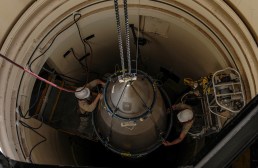Palantir goes to space, inking first deal with Space Force

Silicon Valley big-data company Palantir inked its first contract with the nascent Space Force to deliver data integration tools to help track objects in space.
Through the contract — a one-year, $10 million other transaction agreement — Palantir will prototype a “data backbone” for building a common operating picture of space, according to the company. The Space Force will use the company’s Foundry Suite to better understand what is orbiting the earth, be it satellites, space debris or incoming hostile projectiles.
Palantir “will take the data and convert it into knowledge,” said Col. Jennifer Krolikowski, head of the space command and control modernization program nicknamed Kobayashi Maru.
Space might be a dark void where no one can hear you scream (so the movies say), but it’s full of data. And much of it is captured by sensors operated by the Air Force, which houses the new Space Force, Krolikowski said.
Palantir has years of aerospace experience working with airlines on data-driven projects, but working in space is new territory for the company, Doug Philippone, Palantir’s head of global defense told Fedscoop.
“It is very exciting,” he said. “With your first contract with any service, you have to do an amazing job.”
But in its raw form, space sensor data doesn’t offer the military much, which is where Palantir comes in. The company will provide a “data-as-a-service layer” to create a clearer picture of what is happening above the earth, the colonel said.
Named after a Star Trek training simulation, Kobayashi Maru was created to improve the software acquisition for space systems, much like the Air Force’s Kessel Run. In the past, it would take the Air Force space organization 10 years to buy code — a process Gen. John Hyten, vice chairman of the Joint Chiefs of Staff, described as a “nightmare.”
Kobayashi Maru has cut down the contracting time to a few months, Krolikowski said. It works through a consortium of innovative technology companies called the Space Enterprise Consortium (SpEC) to solicit bids on contracts and start software prototyping. Palantir is one of the more than 300 members.
“It is really a way to attract startups and nontraditional defense companies,” Krolikowski said of the SpEC.
Space Force is a “clean slate” opportunity to redesign much of the Department of Defense’s antiquated acquisition process to better suit the highly technical force, the force’s inaugural leader Gen. Jay Raymond told Congress.
Since the prototype contract lasts only a year, Krolikowski said it’s essentially a test of Palantir to ensure they can deliver on what the Space Force needs.
But for Palantir, the contract represents a big opportunity to get in at the ground floor with the budding Space Force. Palantir has of late been working to expand its defense contracting business and received more government clearances in late 2019.
“There is a lot of great innovation and technology that is out there in industry,” Krolikowski said. “I’m looking forward to working with Palantir specifically but lots of other innovative tech companies that can help bring what my warfighter needs.”






